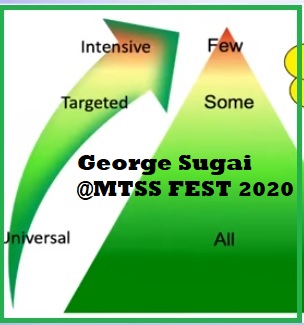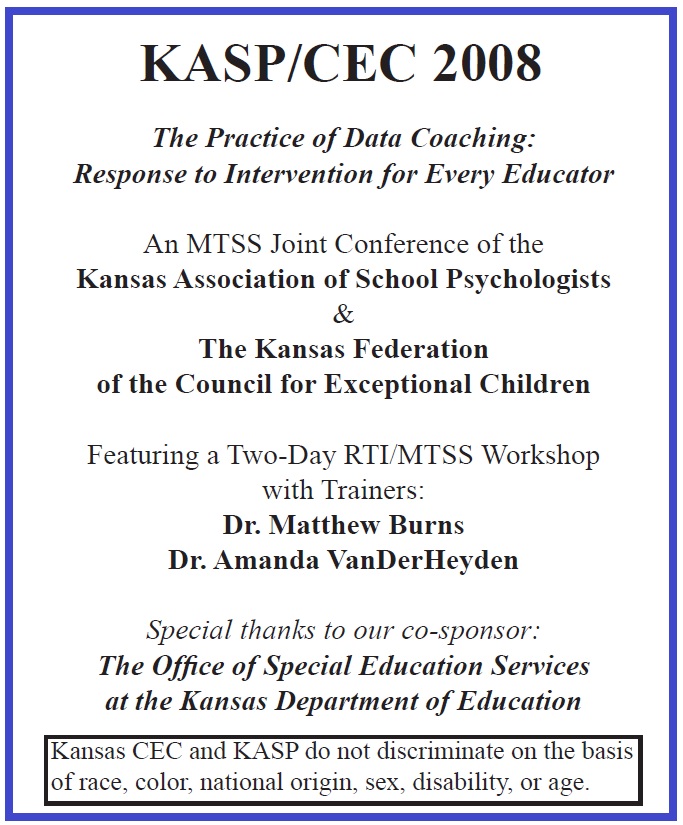
Inaugural Edition
![]()
Opening
Lines of
Communication
with LGBTQ
Youth
A Re-do on
Civil Rights
Thanks to
Black Lives
Matter
Why Critical
Race Theory
Matters
Gloss of Larsen-
Freeman's
Complexity
Theory
Self-
Determination
in Individual
Plans of Study
Questions on
Nuclear Power
from the Pre-
Fukushima Era
Thought
Experiment
to Learn
Action Research
SEE WINTER
EDITION FROM
Nov 2020
to Mar 2021
editor@
Information:
multilingual
adaptive.net
![]()

"There is No Time for Fun or Creativity Anymore"
Are Concerns About MTSS Overblown or Justified?
I have been involved with implementation of a Multi-Tiered Systems of Support (MTSS) framework for differentiating instruction since 2008, when I co-chaired one of the first major RTI (response to intervention) professional development events in Kansas, the KASP-CEC Joint Conference with 340 attendees in Junction City.
Dear Concerned Educator:
Here is my attempt to answer your recent comment in which you expressed frustration with the impact of MTSS on your teaching experiences and the experiences of a number of your fellow teachers. Here is what you wrote:
I remember in IDEA 2004 when the acronym RTI first appeared as an optional route for identifying students with learning disabilities, and I also was able to see up close at a Kansas CEC meeting in Hutch in 2007 when Colleen Riley (Kansas Director of Special Education from 2007 to 2019) introduced us to an overview of MTSS, followed by her providing seed money to stimulate Jim Persinger and me in our work as co-chairs on a joint KASP/CEC conference in Junction City in 2008, "The Practice of Data Coaching: Response to Intervention for Every Educator," one of the early events introducing RTI in Kansas, in tandem with her work leading KSDE's first of many subsequent annual major MTSS state-wide training conferences held that year in Wichita.
Now MTSS is so thoroughly woven into the fabric of K-12 education and teacher preparation programs that there could be a danger of teacher educators or school leaders being lulled into a false sense of security regarding the quality of teaching and learning experiences in our schools, if not for the activism of today's state-wide leadership as well as timely alerts from dedicated teachers at schools where implementation of MTSS practices is not going so smoothly.
I shared your comment with several competent colleagues whose counsel I value and trust. I asked them: Are any of you familiar with this kind of a reaction to MTSS? Is it just based on a misunderstanding of MTSS?
A university professor with many years of teaching experience as a special education professional and who also for a number of years has served on accreditation review teams and is active in the national Council for the Accreditation of Educator Preparation (CAEP) organization as well as the Council for Exceptional Children (CEC), laid out the basic situation that must be faced, in this response to your concerns:
Another individual, who works in MTSS/school mental health training and technical assistance, said that she had encountered teachers with similar frustrations and even had heard PBIS described once as "taking the joy away from teaching."
However, in every case, according to this mental health professional, such frustrations are based on misconceptions, and are always resolved through open and honest conversations about training and fidelity of implementation, along with greater clarity about what is actually going on in classrooms at any given school. Successful implementation of MTSS comes down to whether school leaders make the necessary investment in the professional development and coaching of teachers, as well as commitment to system changes to support teachers.
These two answers really made me think about seeing if I could get you connected with principals who could correspond with you directly about your questions on MTSS and keeping creativity and joy within the K-12 curriculum, for the sake of children, youth, and their teachers.
I also searched the literature for the names of education researchers on related aspects of pedagogy and self-efficacy. I was happy and surprised to find a recent 2019 interview with one of my all-time favorites, N.S. Prabhu, whose book on second language pedagogy (1987) impacted my development. The ideas in his recent interview may be instructive for you and for all of us
When teaching is carried out merely or mostly as an act of conformity to stipulated procedures, with no need for the teacher's "on-site" decisions and no immediate outcome or feedback, it only gets steadily routinized. The term "method" is commonly used to refer to a teaching procedure formulated in advance and conformed to by the teachers involved, so that plausibility has little likelihood or relevance.
A sense of plausibility is likely to begin at some point in the course of making classroom decisions and assessments, especially at points of unexpected outcomes, in my own experience. It then slowly becomes not only clearer and stronger but can make one aware of when learning is happening or not happening, even of what the learning process is comprised of. While it is active and engaged, it keeps growing and changing, increasing learners' success on the one hand and teachers' professional growth on the other. If it ceases to be so, teaching becomes more or less an occupational routine. (Prabhu, interviewed in Pang, 2019, p. 355)
I also found a recent dissertation (2015) by Marcy Hahn at Iowa State University, who did qualitative research interviewing teachers and principals at schools in Iowa regarding experiences and attitudes about the implementation of MTSS in their classrooms. There is a lot that would be worthwhile to go over in her research, but I am especially intrigued by one paragraph in the section she wrote about practical conclusions to be drawn from her data.
That leads me to the third person whom I consulted, regarding the concerns you and other teachers you know have expressed with how enjoyment of teaching decreased during the implementation phase of MTSS, who is a high-level leader in special education and one of the deepest thinkers I have met. The following are this education leader's thoughts in response to your questions about MTSS.
So yes -- still lots of misunderstandings AND misguided implementation. [Your other contact] captured a critical key... investment in the professional learning and coaching teachers, I will add coaching principals as well. The Kansas MTSS and Alignment training system now supports simultaneous installation across language arts, math, social and behavioral--which I hope conveys & sends the message of how valuable each aspect of student growth is. Next on deck is school mental health interventions, incorporating visible learning and fostering teacher self-efficacy.
I hear you and I trust that you have accurately described reality in the honest and frank statement you shared with me. But I believe that if a teacher brings fun and creativity into the first tier, with imaginative ideas and engaging activities, the other two tiers--which are also for general education interventions--will be exciting and fun as well. And I agree with what these other researchers and professionals have said about the role of collaboration with fellow teachers, paraeducators, related service providers, and others, especially the positive effect a leader can have on the development of mutual respect and healthy relationships among all members of the school community.
I am excited to learn more about new phases of MTSS development, such the area of "fostering teacher self-efficacy," which to me sounds like an inspiring idea. I hope some of these ideas have started to answer your questions and have spoken to the concerns you expressed.
My next plan is to suggest a short list of school principals and other school leaders who can share with you practical ideas and insights from positive experiences implementing MTSS in their schools.
Sincerely,
Robb Scott
2020 The Multilingual Adaptive Systems Newsletter

 That event, co-sponsored by the Kansas State Department of Education (KSDE), was an exciting endeavor that launched a number of important MTSS/RTI related initiatives throughout the state and region. A few years later, I was named to the Special Education Advisory Council at KSDE, which considers policy and makes recommendations to the Kansas State Board of Education (KSBE), where both MTSS and PBIS were continually included on our meeting agendas during roll outs of these initiatives in schools across the state. Recently, a teacher shared frustrations she and her colleagues had regarding implementation of MTSS. Her message motivated me to consult several professionals with a great deal more expertise than I have in MTSS, and I shared their responses with the concerned teacher, along with some further data from my own research. Below is a report adapted from the letter I wrote back to that teacher.
That event, co-sponsored by the Kansas State Department of Education (KSDE), was an exciting endeavor that launched a number of important MTSS/RTI related initiatives throughout the state and region. A few years later, I was named to the Special Education Advisory Council at KSDE, which considers policy and makes recommendations to the Kansas State Board of Education (KSBE), where both MTSS and PBIS were continually included on our meeting agendas during roll outs of these initiatives in schools across the state. Recently, a teacher shared frustrations she and her colleagues had regarding implementation of MTSS. Her message motivated me to consult several professionals with a great deal more expertise than I have in MTSS, and I shared their responses with the concerned teacher, along with some further data from my own research. Below is a report adapted from the letter I wrote back to that teacher.
Yes, I remember doing that play and it was a great experience for the kids. Sadly, with all the MTSS groups, there is no time for fun or creativity anymore. As a teacher, I feel it is criminal. I know of so many teachers who retired last year because they couldn't keep doing this to students. One of our teachers just put in her retirement paperwork for the same reason.
MTSS has been added to ensure all students have a chance to have their academic needs met. Due to the extra time it takes to implement MTSS with fidelity many of the extra activities have been omitted. I know itís frustrating for teachers. Some of the omitted activities built relationships, promoted leadership, instilled a sense of community, and let students shine. However, court decisions and both federal and state laws impact what and how we teach.
A teacher's sense of plausibility is her/his own perception of how learning takes place and how a certain form of teaching can cause or accelerate it. It is something that arises, takes shape, grows and gets modified continuously in the course of teaching which engages the teacher's mind and classroom decision-making. It is something of a feel for the occurrence of learning, perhaps similar to a medical practitioner developing an instinctive feel for ailments, or a lawyer knowing instinctively whether a witness is telling the truth. But it happens only when the teacher has a stake in each lesson, making a decision and taking the chance of success or failure, as happens in those other professions.
The goal of MTSS/RTI is student growth. Student growth happens when teachers, who feel competent in their knowledge and skills, improve classroom instruction. Teachers feel confident in their knowledge and skills when administrators empower them with opportunities to share their knowledge, skills, experiences, and perceptions with each other. When teachers and administrators work together, change efforts are more easily implemented because the level of commitment and motivation is likely to be higher. (Hahn, p. 95)
Certainly there are districts where MTSS, or learning for that matter, is not viewed or implemented holistically; might she be in a state or district that still has a " proficient by grade 3 or fail " or schools are graded A-F mentality???
All that I would add to what has been said above, is that whenever I refer to MTSS or RTI in teacher preparation, I place an emphasis on how important it is that the first tier, or stage, is a teacher's real opportunity to show his or her inclusivity awareness and skills, incorporating the guiding principles of UDL (and I always add in the CREDE Standards of Effective Pedagogy for At-Risk Students) to build a general-education base that provides everybody or at least very nearly everybody a path for access to the curriculum.
By Robb Scott
editor@multilingualadaptive.net